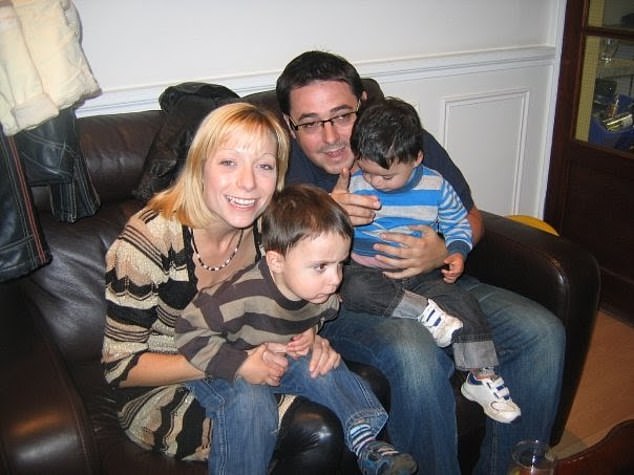It is a cancer that will kill more than 95% of people diagnosed within five years of diagnosis.
Pancreatic cancer is notoriously subtle and is most often only detected at a slow, more deadly stage, but around 10,000 Britons develop the disease every year – that’s roughly one person every hour.
But new tools are set to change that and hopefully improve survival rates for the disease.
The charity Pancreatic Cancer UK, with support from NHS England, is launching “The Family History Checker”, an online resource to help assess your genetic risk of pancreatic cancer.
About 1 in 10 cases of the disease is thought to be caused by a gene that increases the risk of developing cancer.

Rachel Smith with her brother Jim and his two sons Jamie (left) and Harry (right). Jim passed away just eight months after being diagnosed with pancreatic cancer.
Those deemed high risk by the tool will be referred to a specialist for advice.
If this increased risk is identified, the person will be advised to undergo yearly cancer monitoring, which may include blood tests and scans.
The hope is that even if the disease does develop, it will be proactively detected at an early stage when it is easier to treat.
One person who knows all too well the horror of inheriting pancreatic cancer is Rachel Smith.
The 42-year-old has watched both her father and older brother suffer from the disease.
Sadly, for her brother Jim, the diagnosis proved fatal.



Because of her genetic risk, Smith (pictured here with her daughter Lillian) is advised to get regular screening tests to ensure any illness she develops can be detected early.
Her father first fell ill in 2017 but was one of the lucky few whose disease was detected early and whose life was saved by a major 12-hour operation.
Jim wasn’t so lucky: A delayed diagnosis due to the COVID-19 pandemic transformed his case from operable to inoperable.
He died eight months after his diagnosis, leaving behind a young family.
Smith said:When my brother Jim was first diagnosed, the possibility of a genetic link was an afterthought.
“Initially we were just hopeful. We were hopeful because of everything we’d been through with my dad. It wasn’t until Jim passed away that we started to think about the possibility of connecting.”
Given her own risk for the disease, Smith inquired about genetic testing and, after undergoing a similar evaluation with the new tool, was advised to get annual testing and was given a referral for a specialist to contact if she started experiencing symptoms.
This has been extremely rewarding, she says: “It’s reassuring to be invited back for the annual check-ins and it’s good to know that these programs are being put in place for the next generation of Jim’s kids and my kids.”
“Jim was diagnosed at age 43. If he had been on a surveillance program, the changes to his pancreas may have been noticed sooner.”
“Getting at-risk people into these programs as soon as possible makes a big difference. Once it’s too late, there’s nothing we can do.”
Family History Checker herewill ask you questions about details such as your family history of cancer and any other genetic conditions that are associated with an increased risk of cancer.
Diana Jupp, chief executive of Pancreatic Cancer UK, said she hoped the tool would not only reassure people by linking at-risk people to monitoring, but also help save lives.



Smith’s father, Michael, was also diagnosed with the disease in 2017, but was fortunate that the cancer was detected early and he was able to undergo surgery.



Pancreatic cancer has one of the poorest survival rates of any cancer and is worryingly on the rise. Data source: Cancer Research UK



Pancreatic cancer has been called the “silent killer” because its subtle symptoms are often discovered until too late.
“Pancreatic cancer is a devastating disease and when someone in your family has it, it’s hard not to fear for yourself and those around you,” she said.
“We are incredibly proud to receive the support of NHS England in this project, which will help to reduce anxiety around genetic risk of disease and identify those who most need regular monitoring.”
“It is now vital that as many people as possible use the Family History Checker to find everyone who should be included in regular monitoring.”
“The earlier pancreatic cancer is detected, the greater the chance of receiving life-saving treatment. By bringing treatment to more people, we have the potential to save lives.”
Professor Peter Johnson, NHS national clinical director for cancer, added: “This new family history checker is a fantastic tool for families with someone who has been affected by pancreatic cancer and will help the NHS to identify and support people at risk of pancreatic cancer.”
“Finding out if you are at risk of pancreatic cancer can be a daunting discovery and some people may not want to know, but finding out early can mean you get the support you need from the NHS.”
Pancreatic Cancer UK launched the tool after the charity conducted a survey of 1,000 GPs and found that only one in 10 knew where to refer patients for follow-up care.
Incidence of pancreatic cancer in the UK has increased by around 17 percent since the 1990s, and this is thought to be due to the sharp increase in obesity among Britons.
But some groups have seen much higher increases: Mail Online reported earlier this year that rates of the disease had soared by 200 percent among women under the age of 25 over the same period.
No similar spike was seen in men of the same age, so experts are unable to pinpoint the potential cause.



Sven-Goran Eriksson (pictured this week) said on Swedish radio that he has cancer and may only have a year to live.



The Countryfile star, 57, told how wedding vows allowed him to “solidify” his emotions after Charlie (pictured in November 2019) was diagnosed with pancreatic cancer.



Smiths guitarist Andy Rourke dies of pancreatic cancer aged 59
The disease has come into the spotlight after a number of high-profile people have been diagnosed in the past 12 months.
Former England manager Sven-Goran Eriksson recently died from the disease, aged 76.
Meanwhile, it was revealed last May that The Smiths bassist Andy Rourke also died from the disease.
Other famous victims include legendary actors Patrick Swayze and Alan Rickman, and Apple’s iconic founder Steve Jobs.
Britons in their 80s are most likely to be diagnosed with pancreatic cancer and, as with other cancers, the risk of developing the disease generally increases with age.
Other known risk factors for the disease include smoking and obesity.
The pancreas is a tadpole-shaped organ that forms part of the digestive system and also plays an important role in regulating hormones.



Patrick Swayze and Jennifer Grey starred in the 1987 hit Dirty Dancing. Swayze died of pancreatic cancer in 2009 at the age of 57.



Alan Rickman, who starred in numerous blockbuster films including the role of Professor Snape in the Harry Potter series, died of pancreatic cancer in 2016 at the age of 69.



Apple founder Steve Jobs died in 2011 from complications of pancreatic cancer at age 56. Here he is in 2009.
It is located just behind the stomach and is about 25 cm long.
In its role in digestion, it helps produce enzymes that help the body break down food into necessary nutrients.
It is also important in the production of hormones that control blood sugar levels in the body.
Potential symptoms of pancreatic cancer include jaundice (yellowing of the whites of the eyes and skin), itchy skin, and dark urine.
Other signs include loss of appetite, unexpected weight loss, constipation, and bloating.
Although it’s unlikely that your symptoms indicate cancer, it’s important to see your doctor early to be on the safe side, especially if your symptoms have been present for more than four weeks.

